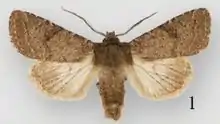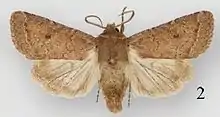Protorthodes curtica
Protorthodes curtica is a moth in the family Noctuidae first described by Smith in 1890. It is found in North America from the interior of southern British Columbia southward in the West Coast states, mainly to the east of the Cascades and Coastal ranges, to southern California. It occurs in the Rocky Mountains in Idaho and Montana and in the Ruby Mountains of Nevada. The habitat consists of dry forested areas.
| Protorthodes curtica | |
|---|---|
 | |
| Male | |
 | |
| Female | |
| Scientific classification | |
| Kingdom: | |
| Phylum: | |
| Class: | |
| Order: | |
| Family: | |
| Genus: | |
| Species: | P. curtica |
| Binomial name | |
| Protorthodes curtica (Smith, 1890) | |
| Synonyms | |
| |
The length of the forewings is 12–16 mm. The forewings have a dark reddish tint and a pale, curved subterminal line that follows the wing margin. There is an even band of dark shading along the inner edge of the subterminal line and the reniform is faintly outlined by a pale line. Adults are on wing from late June to mid-October.[1]
The larvae feed on various herbaceous plants, including Asteraceae (including Ericameria species), Scrophulariaceae and Rosaceae and species.[2]
References
- Lafontaine, J.D.; Walsh, J.B.; Ferris, C.D. 2014: A revision of the genus Protorthodes McDunnough with descriptions of a new genus and four new species (Lepidoptera, Noctuidae, Noctuinae, Eriopygini). ZooKeys, 421: 139-179. doi:10.3897/zookeys.421.6664
- Pacific Northwest Moths
| Wikispecies has information related to Protorthodes curtica. |
| Wikimedia Commons has media related to Protorthodes curtica. |